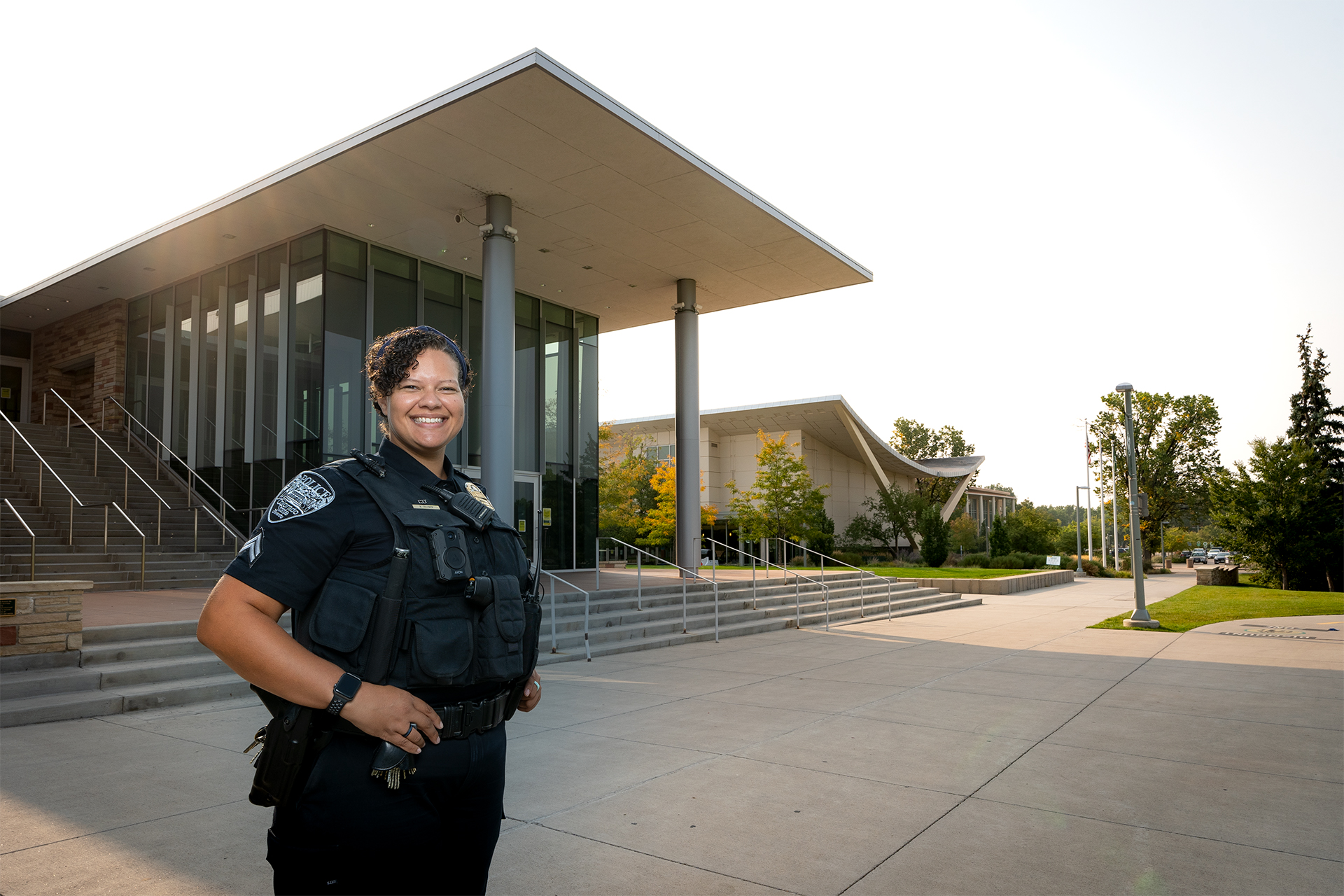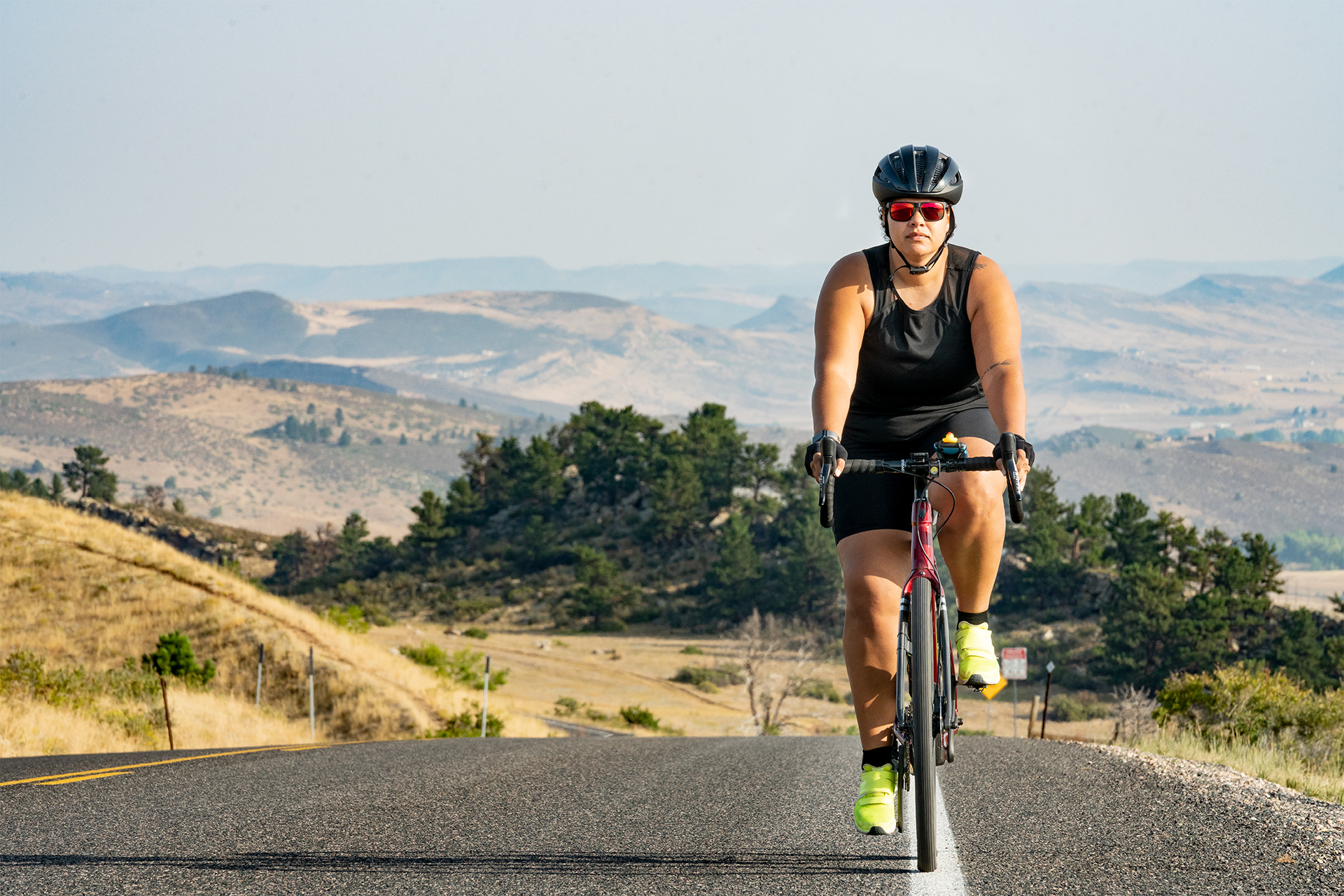
Alisha Zellner’s national initiative that brings awareness to injustices in the criminal justice system includes a local community bike ride that she plans to hold every July. Photo by Joe Mendoza/CSU Photography
If you ask Alisha Zellner to describe herself, she’d likely say that it’s complicated; the three identities she aligns with have been in conflict with each other in her heart, on the nightly news, and across the nation. It is a question she has found troubling: How to be Black, white and blue, all at once.
A corporal in the Colorado State University Police Department, Zellner insists that it’s possible to be all three, including being pro-Black and pro-police – and that it’s not about choosing a side. She’s found her place embracing them all.
“Everyone in this conversation has a common goal: for our communities to be safe,” Zellner said. “We all live in the same communities. So many people want everyone to choose a side, and I’m not going to do that. I’m here to try to make my community a better place, and if I can do that by being Black, white and blue – using all of my identities – that’s what I’ll strive to do.”
Earlier this year, she was preparing for the Police Unity Ride, a 250-mile bike ride to remember law enforcement officers who have died in the line of duty. While that ride was canceled due to COVID-19 concerns, she rode the 250 miles on her own. She dedicated that effort to her passion for making a positive difference, through both law enforcement and mental health. She feels that secondary trauma, post traumatic stress, and the stigma police officers face when getting or seeking mental health help have a deep and profound impact on both officers and their families.
Ride for Black Lives, community

Photo by Joe Mendoza/CSU Photography
The Police Unity Tour sparked the idea for another kind of bike ride – one with which she also connects deeply. Zellner recently founded Bike Ride for Black Lives, an initiative that brings awareness to the Black Lives Matter movement and injustices in the criminal justice system. Through Bike Ride for Black Lives, Zellner has ridden more than 560 miles and raised nearly $7,000 to be split evenly among five organizations: Black Lives Matter; NAACP Legal Defense Fund; Equal Justice Initiative; the National Museum of African American History and Culture in Washington, D.C., and the National Center for Civil and Human Rights in Atlanta.
The initiative also included a local Community Awareness Ride on July 12 that allowed residents to come together and ride with her through the streets of Fort Collins. Nearly 200 riders and volunteers rode in solidarity that day. Zellner is now planning to hold her ride every July, as well as to participate in the Ride for Racial Justice this fall.
As a police officer, Zellner continues to advocate for providing officers with better mental health support to deal with continual trauma, something she hopes will be an outcome of the current national conversation about law enforcement sparked by the Black Lives Matter movement. She hopes it will provide a societal balance that alleviates responsibility on police officers to respond to problems that could be handled differently.
“People have forgotten how to treat other people like humans,” Zellner said. “Police are called for everything because there is a lack of civility in society and people no longer engage in a conversation with someone as a way to negotiate a concern or potential conflict. This is about how we all – society – treat each other. Police are called because people would rather have a police officer have an uncomfortable yet civil conversation with someone than do it themselves. And then when the police show up, people see the uniform and are automatically upset.
“We are always here to help, and we must and always will respond to every call. But if some of that focus was shifted to education, social work and treating each other like human beings, police would be able to focus on more serious issues,” she added.
Zellner has been a police officer at CSUPD since December 2014 and truly believes in Mahatma Gandhi’s philosophy: “Be the change you wish to see in the world.”
Despite the pressures in the current climate, Zellner says she has never picked one racial identity over the other before and does not believe she should have to choose between any of her identities now.
“We will only be able to make a change if we do it together,” Zellner said.
